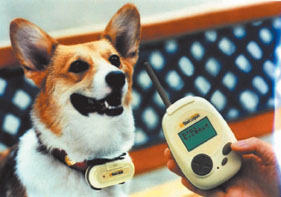Hot Dog
Back to Contents of Issue: January 2003
|
|
|
|
by Tim Hornyak |
|
 Japan is a country where people in times of recession will happily fork out JPY15,000 for a therapeutic regimen of Dead Sea mud packs, a massage and ear wax removal. Thing is, it's for their dogs. Japan is a country where people in times of recession will happily fork out JPY15,000 for a therapeutic regimen of Dead Sea mud packs, a massage and ear wax removal. Thing is, it's for their dogs.Small wonder that a gadget heralding a new age of communication with canines for about the same price is being snapped up by pet-mad Japanese. Launched in late September, Takara's Bowlingual supposedly has the Dr. Doolittle power to discern doggie feelings and convert woofs to words through voice-pattern recognition. Takara, the country's third-largest toymaker, claims an accuracy of over 90 percent in enabling pooches to parlez-vous Japanese through a handheld translator that classifies barks into six emotional states. And shoppers are rolling over for Bowlingual, which has sold out at outlets of mass retailers such as Tokyu Hands, leaping off the shelves at a rate of nearly 100 units a day. The gizmo consists of a wireless microphone and transmitter that attaches to dog collars and a small translator displaying canine-language messages in perfect nihongo, along with a facial expression on a monochrome liquid-crystal screen. It sorts sounds into the categories of happy, sad, frustrated, angry, assertive and demanding, and has a repertory of about 200 phrases, such as "Ya ne! Soba ni konai de!" (Hey! Don't come near me!) "Talking with animals is a dream that every human has," says Kuniharu Hirabayashi, a Takara product developer who worked on the contraption as part of his firm's "life entertainment" drive to make toys for adults. Takara, known for toy hits like the Licca-chan doll, Henshin Cyborg and Transformers robots, sees the market for pet products growing to tens of trillions of yen. The company is targeting women in their 30s to 50s with Bowlingual, its first foray into the market. The product is also the first commercial application of an animal voice analysis system created by mobile content developer Index and Japan Acoustic Laboratory's Matsumi Suzuki, an acoustics expert who used a large database of animal sounds to derive the patterns that denote canine moods. Each breed has a unique voice print determined by physical features such as snout and neck length. Varieties such as Golden Retriever are apparently easier to translate than less voluble bow-wows, though the amount of dog talk can depend on the dog's personality. Research suggests there are universal behavior patterns shared by all canines, from wolves to Chihuahuas. In his book How to Speak Dog, University of British Columbia psychologist Stanley Coren states that the average hound can understand about 140 words and gestures, roughly the same as a two-year-old child, adding, "Our ability to live successfully and happily with any dog may depend upon our competence in reading the dog's language." In that respect, Bowlingual may be an advantage to owners at a loss in dog deciphering, but they should be aware that the actual text messages are chosen at random from about 40 preset phrases within the emotion categories. "The random feature is almost like talking," says Hirabayashi, who spent over a year testing the interpreter daily with a pack of dogs in a Katsushika Ward park in Tokyo. "But sometimes with the random sentence, the owner thinks it's 100 percent right, and they're very happy." Since most dogs in Japan are miniature breeds due to the country's cramped housing, some customers have complained that the mike unit is too large. Takara wants to shrink and add a voice function to Bowlingual, which can also analyze pooch behavior and health observations input by users, as well as issue reminders when it's time to visit the vet. Meanwhile, the firm is working on versions for markets in Europe, North America and other countries in Asia. It begs the question: Could there also be a Meowlingual? "If (customers) send me a letter or email, maybe I'll consider it," grins Hirabayashi. @ |
|
Note: The function "email this page" is currently not supported for this page.





